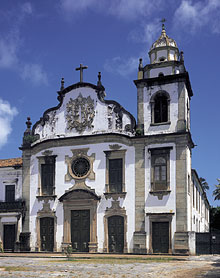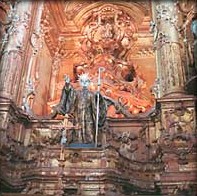The Journey - Recife - July 28 - August 13, 1980
August 7 Missed yesterday's entry: up at 6.30 to travel to Pumaty
sugar mill and refinery, back 8 p.m. preparing for interview with Gonçalves de
Mello till 10.30 leaving little time for notes.
Started today with visit to the state tourist authority,
which for two days has been trying to meet a simple request: to obtain a
map of the state. Result. “Is not possible.” Brazil, the sublime and
ridiculous, the contrasts!
Where else would you, one day, visit one of the most
sophisticated sugar estates in the world that not only grows 7,000 hectares of
the stuff but mills it through a five-mill line up and then refines it for
export... And the next day, encounter a state tourist authority that is unable
to provide a simple map of the state!
 |
| Pumaty Engenho, Casa Grande, Pernambuco |
 |
| Pumaty Engenho, chapel, Pernambuco |
 |
| Pumaty Engenho, private chapel, Pernambuco |
On Pumaty estate, there's a beautifully preserved Casa
Grande, the pride of the owner. As I sat with him and his elegant wife, and the
social worker they had employed to help their employees, I could not but glance
at the wall behind them: dangling from an iron spike, prominently on display,
was an slave ball and chain. Oh, the contrasts.
 |
| Slavery, relic - Pumaty, Pernambuco |
This morning spent at Baptist seminary examining journals
of last century Baptist missionaries. Rather simplistic though see that Taylor,
one of earliest Baptist missionaries, actually notes occurrence of Canudos with
somewhat confused interpretations. But more important was Baptist reports of
the degree of intolerance present prior to the coming of the Republic
and separation of State/Church. Repeated reports of attacks on missionaries, of
anti-Protestant moves inspired by local priests, of Bible burnings etc.
The Baptists get vitriolic in their condemnation of the RC
church as idolatrous, pagan etc. with numerous references by Taylor to idol
worship in form of saints etc. Today the Baptists have 500,000 followers, as
against 90 percent of 120 million Catholic, which shows the progress...
Day 31 of the trip. How far from that evening so long, long
ago when I left Sintra and family at the station.
My confidence continues to soar. Today's interview with
João Gonçalves de Mello, Recife's foremost historian, was typical. Impressed by
my knowledge of Brazilian history. Ran basic outline of my story against him
and 90 percent stood up without critique!
Realize that aside from the setting, atmosphere I am
getting on the trip and basic groundwork already complete, when I get back I am
going to have to read my way into the fine details of every traveler, every
translation I can lay my hands on. This can be an ongoing process as the book
develops, so that I'll have the background pretty well locked up. And then
comes the “imagination!”






 a cell prepared for me: traditional monastic term for what is really a large room bereft of worldly possessions, a bed, bureau and two chairs. Deeply moved during various services by the chants, psalms sung by choir, the melodiousness of their voices echoing in lofty 1761 church, the intonations reaching deep within oneself.
a cell prepared for me: traditional monastic term for what is really a large room bereft of worldly possessions, a bed, bureau and two chairs. Deeply moved during various services by the chants, psalms sung by choir, the melodiousness of their voices echoing in lofty 1761 church, the intonations reaching deep within oneself.


